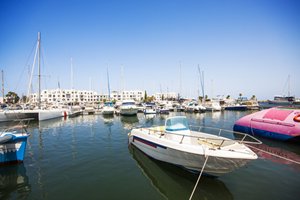
Tunisia, a gem nestled in North Africa, is a country brimming with rich history, diverse culture, and a wide range of impressive landscapes. While often overshadowed by its larger neighbours, Tunisia boasts a wealth of unique attributes and fascinating stories. Here are ten intriguing facts about Tunisia that might surprise you.
Tunisia is home to the ancient city of Carthage, one of the most powerful cities in antiquity. Founded by the Phoenicians in the 9th century BC, Carthage became a major centre of trade and military might in the Mediterranean. Today, the ruins of Carthage near Tunis are a UNESCO World Heritage site, attracting history enthusiasts from around the globe.
Tunisia has a rich tapestry of cultural influences due to its history of conquests and migrations. Berbers, Phoenicians, Romans, Arabs, Ottomans, and French have all left their mark. This blend is evident in Tunisia’s architecture, cuisine, and languages, making it a vibrant and diverse country.
Movie fans might be surprised to learn that Tunisia served as a filming location for several Star Wars movies. The desert landscapes of southern Tunisia were used to depict the planet Tatooine, Luke Skywalker’s home. Fans can visit the actual sets, some of which remain preserved as tourist attractions.
Every year, Tunisia hosts the International Festival of the Sahara in Douz, celebrating the rich traditions of the Sahara Desert. This event features camel races, traditional music and dance, and displays of desert craftsmanship. It’s a vibrant showcase of the nomadic culture that has thrived in this region for centuries.
Tunisia is one of the world’s largest producers of olive oil. The country is dotted with vast olive groves, some of which date back to Roman times. Olive oil production is a significant part of Tunisia’s economy, and its high-quality oil is sought after worldwide.
Beyond Carthage, Tunisia boasts some of the best-preserved Roman ruins in the world. The ancient city of Dougga, another UNESCO World Heritage site, offers a remarkable glimpse into Roman urban planning and architecture. Its well-preserved temples, theatres, and public baths are a testament to the grandeur of the Roman Empire.
Tunisia has a diverse religious history. While predominantly Muslim, the country also has a rich Jewish and Christian heritage. The El Ghriba Synagogue on the island of Djerba is one of the oldest synagogues in Africa, and the ruins of early Christian basilicas can be found throughout the country.
The Medina of Tunis, a UNESCO World Heritage site, is a maze of narrow alleys, bustling souks, and historic mosques. Dating back to the 7th century, it is one of the best-preserved medieval Islamic cities in the world. Exploring the Medina offers a sensory overload of sights, sounds, and scents, reflecting centuries of history.
Tunisia’s Mediterranean coastline is dotted with beautiful beaches and luxurious resorts. From the pristine sands of Hammamet to the picturesque shores of Sousse, Tunisia’s beaches are perfect for sunbathing, swimming, and water sports. These coastal areas are also rich in history, with ancient forts and ruins nearby.
Tunisia is famously associated with the fragrant jasmine flower, which holds cultural significance. The national flower of Tunisia, jasmine is used in traditional celebrations, weddings, and even perfumery. The “Jasmine Revolution” of 2011, which led to significant political changes in the country, is named after this beloved flower.
Tunisia’s unique blend of ancient history, diverse culture, and natural beauty makes it a captivating destination with countless stories to tell. Whether you're a history enthusiast, a beach lover, or an adventure seeker, Tunisia offers something for everyone. So next time you think of North Africa, remember the hidden gem that is Tunisia and the fascinating facts that make it so special